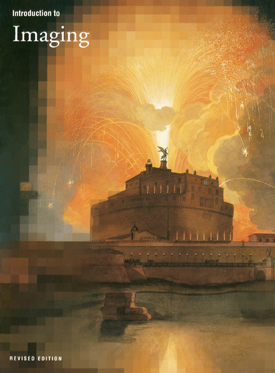
Introduction to Imaging
Howard Besser. Revision edited by Sally Hubbard with Deborah Lenert
2003
96 pages
PDF file size: 31.8 MB
Description
The first edition of Introduction to Imaging was published in 1995 and quickly became a standard textbook on the construction of digital image collections. The Visual Resources Association Bulletin praised it for setting forth “important basic principles and technical terms that anyone beginning an imaging project would need to know.”
Significantly expanded and updated, the revised edition of Introduction to Imaging allows curators, librarians, collection managers, scholars, and students to better understand the basic technology and processes involved in building a cohesive set of digital images. It also explores how to link digitized images to the information required to access, preserve, and manage them. Other topics include making data interoperable with other information resources and activities; developing strategies that do not limit or foreclose future options; and ensuring the longevity of digital assets.
The Introduction To series deals with the complex issues and tools related to the production, management, and dissemination of cultural heritage information resources.
Table of Contents
- Introduction
- Part I. Key Concepts and Terms
- The Digital Image Defined
- Standards
- Metadata
- Metadata Crosswalks and Controlled Vocabularies
- The Image
- Image Reproduction and Color Management
- Bit Depth/Dynamic Range
- Resolution
- Compression
- File Formats
- Networks, System Architecture, and Storage
- Part II. Workflow
- Why Digitize?
- Project Planning
- Collection Selection
- Conservation and Access Status
- Legal Status
- Project Team and Workflow
- Standards Selection
- Digital Asset Management
- User Requirements
- Digital Preservation
- Selecting Scanners
- Image Capture
- Master Files
- Access Files
- Selecting a Metadata Schema
- Metadata Format
- Quality Control
- Delivery
- Security Policies and Procedures
- Long-Term Management and Preservation
- Conclusion
- Glossary
- Online Resources
- Bibliography
- Contributors
- Illustration Credits
About the Authors
Howard Besser is the founding director of New York Universitys master’s degree program in Moving Image Preservation. He was formerly a professor in the School of Education and Information Studies at the University of California, Los Angeles, and has in the past been in charge of information technology for two art museums. Since 1985, he has also been involved in numerous projects dealing with the digitization of cultural heritage materials and has been in the forefront of the investigation of issues of digital longevity. His teaching and research interests include multimedia, image databases, digital libraries, metadata standards, intellectual property, digital longevity, information literacy, and the social and cultural impact of new information technologies. He is the author of several dozen articles and book chapters on these subjects. He is a participant in the InterPARES (International Research on Permanent Authentic Records in Electronic Systems) 2 project and has served on various national and international committees and panels on issues surrounding the documentation and archiving of digital information.
Sally Hubbard is digital projects manager at the Getty Research Institute, with responsibility for the digitization, persistence, and continued accessibility of virtual collections. She was formerly new media coordinator of the Film and Television Archive at the University of California, Los Angeles, where she developed educational multimedia resources. She served as associate editor for The Moving Image, the journal of the Association of Moving Image Archivists; is a participant in the InterPARES 2 project and the Education and Outreach Committee of the Moving Image Collection (MIC) portal; and has presented numerous papers and workshops on digital preservation and related issues. She has a masters degree in African Area Studies from UCLA.
Deborah Lenert is digital projects specialist at the Getty Research Institute. She is involved in digitization and collection information projects, primarily dealing with text-and-image-based special collections materials. She has previously worked in software and database development and user training in the area of records management. She has a masters degree in Instruction from Drexel University.